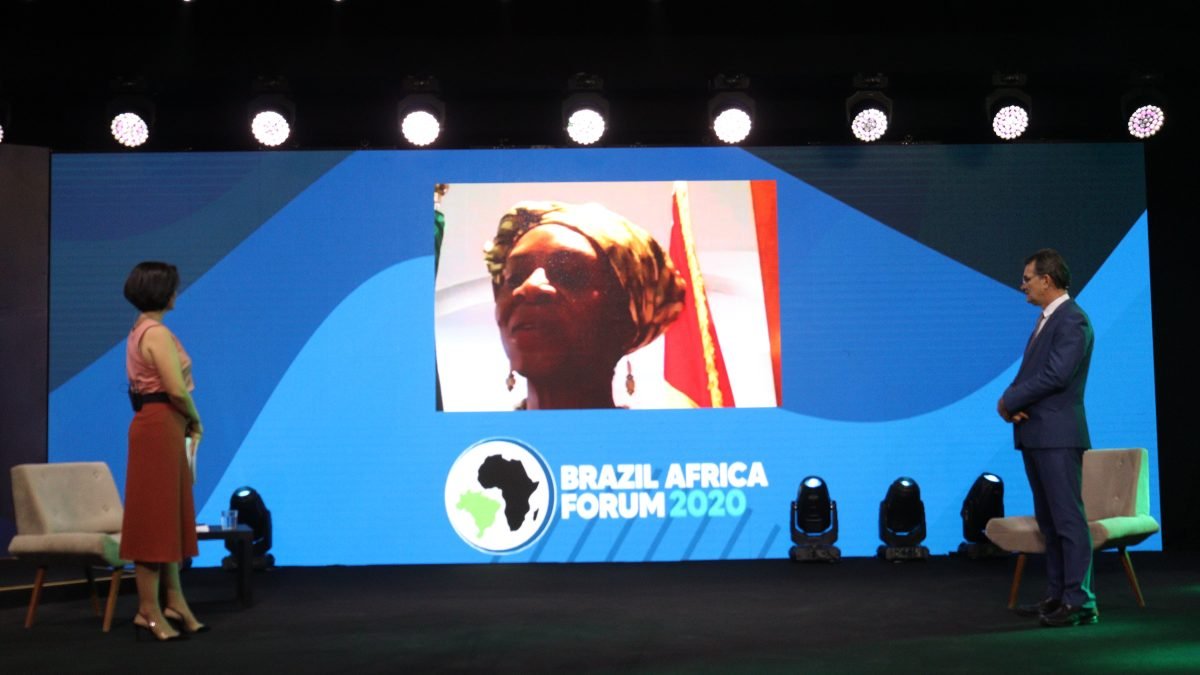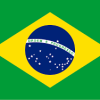Message from Abena Busia, Ambassador of the Republic of Ghana to Brazil, on behalf of H.E. President Nana Akufo-Addo

Abena
BRAZIL AFRICA FORUM 2020
4 NOVEMBER 2020
Dr Joao Bosco Monte, President of the Brazil Africa Institute,
Elected and Appointed Members of Government and State Bodies; Your Excellencies, Members of the Diplomatic Corps, and Representatives of Multilateral Organizations; Distinguished Delegates and Friends,
I deem it a great honour to deliver a Statement on behalf of the President of the Republic of Ghana, who due to prior commitments is unable to join us today. HE Nana Addo Dankwa Akufo-Addo, however extends his best wishes to the organizers of the Forum for a successful event.
The theme for this Brazil Africa Forum 2020 “Overcoming the Challenges of the Pandemic, What Is Next?” is very timely at this period when the whole world is confronted with the Covid-19 pandemic, and countries have adopted multifaceted but not necessarily coordinated approaches in tackling the health crisis. The issue that continues to engage the attention of policy makers is how to strike the right balance between public health and safety, and promoting economic growth and development.
Excellencies, Ladies and Gentlemen,
The Covid-19 disease which started in the early part of this year has disrupted all aspects of our lives – education and health systems, banking, trade, industry and commerce, airline and tourism services, and the global supply chains that support all of this. All of us, the world over, are still processing the full impact of this pandemic which, witnessing the resurgence in the global North today, is not going away any time soon.
Following the outbreak of the virus in Ghana, on 12th March 2020, President Akufo-Addo and his government, moved very quickly to announce the closure of the country’s air, land and sea borders. What followed was a lockdown in Ghana’s major cities and towns comprising intense fumigation of markets and public spaces; the closure of schools, businesses and religious meeting places; and the banning of public gatherings including our all-important funeral celebrations. These bans lasted about five months and were only lifted following public health advisories.
In order to address the socio-economic impact of the pandemic the Government of Ghana, like other countries, put in place a number of fiscal, monetary and social intervention policies, to cushion the sections of the population most adversely affected by the freeze on the economy.
Some of the measures included free allocation of food supplies for low income-earners, subsidies on provision of utility services; the supply of water; and payment of bills for COVID-19 tests at the initial stages of the pandemic. The government further provided incentives for health workers which included exemption from the payment of tax on emoluments for a six-month period, 50 percent on the monthly basic salary for four months, and also gave an insurance package for all frontline health workers including those engaged in contact tracing and enforcement of quarantine regulations.
None of this could have been done without support: it was the readiness of a government with a plan that garnered the assistance of such partners as WHO, the World Bank and the IMF within days. Among the measures introduced to mitigate the impact of the pandemic was the setting up of the COVID-19 Alleviation Fund, a fund which garnered wide support from ordinary Ghanaians the world over.
The Ministry of Health implemented various measures to increase response capabilities, such as drones to collect blood samples from over 1000 health facilities and “pool testing” to increase capacity of the rate of testing. The extensive use of contact tracing immediately the first cases were confirmed, helped control the spread of the virus from the start. The COVID-19 Tracker App was launched to help people assess and self-report symptoms, undergo contact tracing and provide access to health services. The Government continues to pursue an aggressive management of the Covid-19 after the resumption of international travels through Kotoka airport, which remains the only port of entry, with a series of testing regimes to ensure the safety of all citizens.
In Ghana we have always believed you must claim your past to know your future. This history is helping us focus on our best practices because we need to plan, cooperatively, nationally and regionally. Government, at the onset, undertook consultations with various stakeholders including traditional and religious leaders, business organizations and other interest groups, and most crucially adopted a powerful communication strategy which enabled the leadership of the country to disseminate accurate information to the general population. There can be no question that the President’s weekly updates to the nation, delivered in person with clear, concise information and instruction was one of the most effective tools deployed.
Distinguished delegates,
It must be emphasized that the timely interventions deployed by the government were buttressed by our previous experience in handling similar outbreaks with other countries and organizations from the sub-region. That, and the grace of God, accounted for the low record of cases and fatalities from the Covid-19 in many parts of the Continent. Our policy measures designed to fight the virus, which were in line with WHO and other international standards, has received international recognition. We trust this success story can be leveraged in other parts of the world.
The health crisis has nonetheless brought to the fore, the challenges inherent in our health and economic systems as well as issues of social inequality and the need for inclusive and sustainable development that is resilient enough for the post-COVID-19 future. It has highlighted the urgent need for countries to build local capacity in specific sectors of the economy. Ghana has already expanded its domestic capability to deepen self-reliance through investing in bespoke solutions to contain the virus. For instance, at the beginning of the pandemic, the country had only three laboratories for testing samples of the virus, this expanded to ten in a relatively short time.
The Government’s integrated Industrialization strategy, its digital architecture, alongside flagship programs such as the Planting for Food and Jobs served as a catalyst not only for the manufacturing of diverse much-needed medical supplies, its increased food security at the critical period of the pandemic. In this instance we must recognize the role Brazil has played in the transformation of our Agricultural output which enabled us, even at this time of crisis, to supply food to our neighbours. We are grateful for the support and pray for the continuation of this valuable partnership.
In moving forward, priority attention must be focused on science, technology and innovation to create the necessary eco-system for economic growth and diversification. The search for a vaccine has made the urgent case for countries to prioritize research and development into various therapeutics and modern medicine to safeguard against any pandemics and epidemics. This will require collaborative efforts between the universities, the orthodox and traditional medical research institutions and the private sector in global public health.
One of the singular features of response, has been the readiness of young people to support and protect community efforts through their inventiveness. One such spectacular success for Ghana is the invention of the solar powered hand washing sink which delivers soap and water in regulated time, long enough to ensure the removal of any lurking viruses. This simple and effective structure received certification in a record number of days and has gone into production endorsed not only by the President, but the UN. We must continue to find ways to ensure such innovations will be supported. It is imperative for governments and the international community, to inject fiscal stimulus into sectors that have been impacted by the Covid-19 in a bid to create new people-centered opportunities for employment for the youth and other marginalized social groups.
Governments should prioritize trade and investments in a timely manner to mitigate the effect of the pandemic. The Continental Free Trade Area which will become operational in January 2021, with its HQ in Ghana will be critical to the economic transformation of the continent as it explores strategic partnerships with other regional groupings and countries including Brazil within the framework of south-south cooperation for our mutual benefits.
Obviously governments should make a conscious effort to improve inter-continental cooperation in the fight against this pandemic. In that respect, I wish to mention the rapid response by the Economic Community of West African States (ECOWAS) and the African Union (AU) in establishing the Regional Coordination Mechanism and the Africa Joint Continental Strategy for Covid-19 Outbreak which is in line with the goals for sustainable development.
Finally, as the economies of various countries open up together and search for new business models let us not forget the ones that have served us well. Let us put in place basic things like hot lines in schools for teachers to report any virus -related symptoms, and let us never forget the urgent need for the basic preventative thing: continuous public education on simple protective protocols such as personal hygiene, frequent hand-washing, social distancing, and the wearing of masks. I thank you all for your kind attention.


